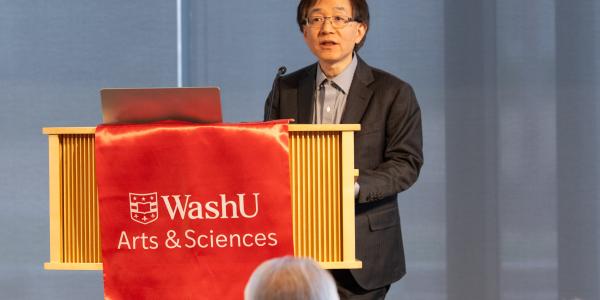Want to age well? Researchers in psychological and brain sciences are exploring what helps people live better and longer.

We all get older one day at a time, but we don’t necessarily age at the same pace. Some people in their 60s, 70s, or beyond have energy, mental sharpness, and a quality of life that defies the decades.
Healthy aging isn’t just an aspiration or a trope for pharmaceutical ads. For researchers with the Department of Psychological & Brain Sciences — including professors Brian Carpenter, Patrick Hill, and Julie Bugg — it’s a major focus of research. They work with local older people, ask new questions, and identify the lifestyles and strategies that help people thrive in later life.
September is Healthy Aging month, but research into the phenomenon is a year-round priority, said Carpenter, who also serves as the co-director of the Harvey A. Friedman Center for Aging. “The pace of research here and elsewhere is just phenomenal,” he said. “We're trying to see how we can help people achieve rich, robust lives in all of the ways that matter.”
What it means to age well
To truly support people in their later years, researchers must address a fundamental question: What does healthy aging actually look like?

For answers, Hill goes straight to the source. “We’re asking older people what healthy aging means to them, and the responses have been revealing.”
Hill, along with Ryan Bogdan, the Dean's Distinguished Professor of Psychological & Brain Sciences, is the primary investigator of the SPAN study, an ongoing project that has followed more than 1,600 people in the St. Louis area since 2007. Through surveys and interviews, Hill and other researchers track personality traits, mental and physical health, social adjustment, and other factors over time and across generations.
Healthy aging, Hill has found, is more than avoiding disease. Older adults have goals and priorities beyond the physical effects of aging on their bodies. “They are especially concerned about family relationships, social connections, and emotional well-being,” Hill said. “Physical health matters, of course, but it’s only a part of the picture.”
The power of purpose
When speaking with older people, Hill and colleagues found that successful agers often have something in common: A sense of purpose. Whether they’re taking care of a garden, volunteering in the community, or spending time with grandchildren, they thrive on personal accomplishments. “Older people with a sense of purpose tend to be doing better in their lives,” Hill said. “They are less likely to be depressed, less likely to develop chronic diseases, and they tend to live longer.”
Hill co-authored a 2023 study showing that purpose helped protect older people from loneliness, a potentially destructive force at any age. Hill and his team have found that having a life with purpose also helps protect against stress. “Older people with a sense of purpose tend to be less reactive when something goes wrong,” he said. “They aren’t likely to let one setback derail them, and they’re more likely to exercise and eat well. It all adds up to greater well-being.”
Many older people find their purpose through their community. “A lot of psychology is focused on the individual, but we also have to think about social relationships and group activities,” Hill said. Mary Cox, a graduate student in Hill’s lab, is exploring how older people can find a sense of purpose by working in a community garden.
The role of relationships
The social relationships that help sustain people through the decades have been a major area of study for Carpenter and his team. “Aging is rarely done in isolation,” Carpenter said. “There’s a convoy of people who move with you throughout your life, and that convoy changes over time. We're trying to understand how those different social relationships affect older people and what they can do to maximize those benefits.”
Carpenter is especially interested in the communication patterns that drive and define relationships, for better or worse. “Communication networks are extremely important for older people,” he said. “We’re trying to help older people, their families, and healthcare professionals interact effectively.”
There is much room for improvement. In a 2023 study that included graduate student Jessica Hahne and then-undergraduate students Tim Chung, AB ’24, and Hannah Silverstein, AB ’24, Carpenter found a disconnect between older people and their adult children when it comes to approaches to medical issues, such as chronic pain and cognitive decline. “It’s important for everyone to be on the same page,” Carpenter said. “Having frequent and candid conversations about aging is important.”
Cognitive resilience in later life

Some mental decline may be inevitable with age, but older people often find ways to compensate. Bugg, director of the Cognitive Control & Aging Lab, studies how aging impacts cognitive control, which is a person’s ability to manage their thoughts, actions, and emotions to achieve their day-to-day goals. She and her team use computerized tasks to compare healthy adults over 60 and younger adults under 30 as they cope with distractions that can interfere with goals.
The tasks show that older people have trouble maintaining focus when faced with frequent distractions. But a 2025 study led by Merve Ileri-Tayar, a graduate student in Bugg’s lab, also found that they retain a surprising degree of “reactive control” — the ability to quickly process unexpected but familiar distractions while completing a task. “It challenges the belief that all aspects of cognitive control decline with age,” Bugg said. The study was conducted in collaboration with Todd Braver, the William R. Stuckenberg Professor in Human Values and Moral Development, and graduate student Thomas Dudey.
Bugg notes that older adults have spent years coping with daily disruptions, and that practice may help prepare them to handle challenges in later life. “They can draw upon their extensive past experience to guide their attention in the face of distraction,” she said.
Bugg and colleagues are now exploring strategies that can help older people in conditions where attentional lapses are prevalent. In one recent experiment, Bugg’s lab found that older adults performed better when given a simple but frequent reminder of the task goal. “The finding may open up interesting avenues for interventions,” Bugg said. “We could potentially design apps to deliver reminders during times when distractions could be a problem.”
Aging isn’t easy. But WashU researchers are doing their part to support older people in St. Louis and beyond.
“Psychologists have made a lot of progress in this field,” Carpenter said. “This is a great time to be getting older.”
Header image credit: Mart Production/Pexels





